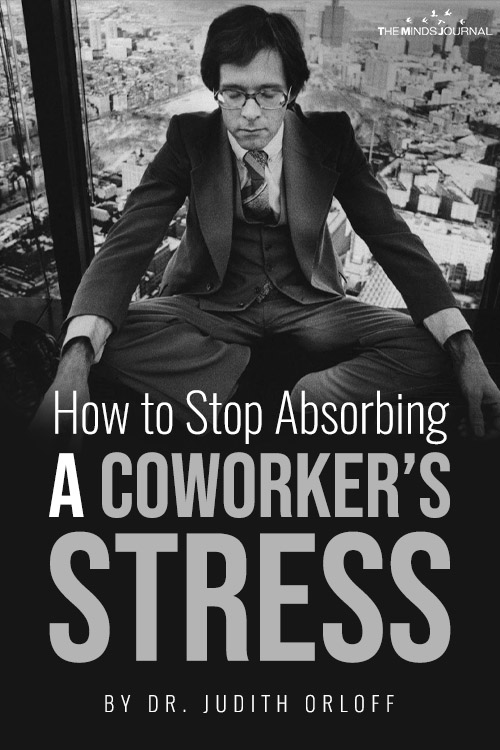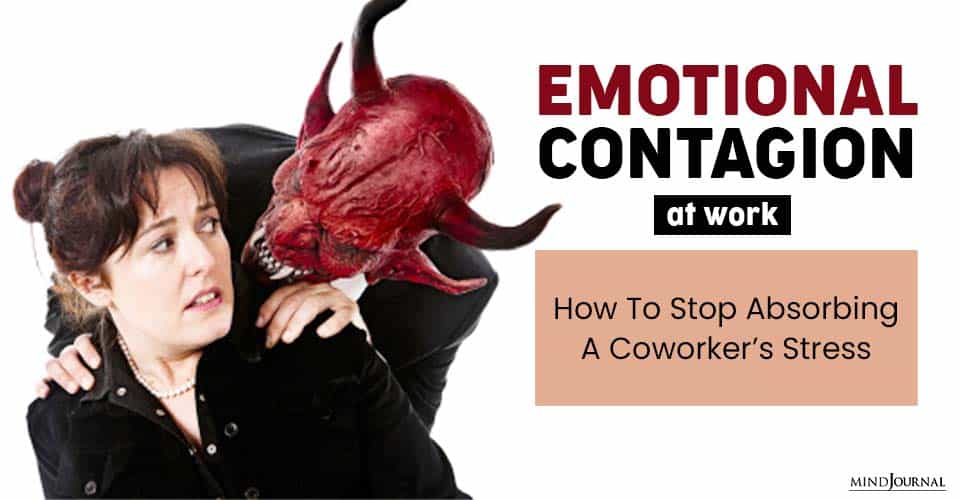Research has documented that we can catch each other’s emotions, a phenomenon known as “emotional contagion” even at work. One employee’s anxiety and panic can spread like a virus in milliseconds throughout an entire office, lowering morale and productivity. Happiness can also build in a workplace (known as “positive emotional contagion”), which results in improved employee cooperation, satisfaction, and performance.
Though everyone is susceptible to emotional contagion, it is amplified in empaths and highly sensitive people. The good news is that sensitive people can benefit from all the positive energy that circulates at work. The difficult news is that we can pick up our co-worker’s emotions or illnesses until we learn to avoid taking on their stress.
Why are we so prone to taking on other people’s moods at work?
Everybody has hard days. Unfortunately for many of us, especially those who are highly sensitive, a hard day at your coworker’s desk can turn into a hard day at yours because of your sensitivities. Many offices today are designed to be “open space,” where desks are not separated from each other by walls or they consist of cubicles with simple glass partitions.
Everyone basically shares the same area. You can hear people talking, complaining, gossiping, coughing, blowing their noses, laughing, humming, cracking their gum, and opening candy wrappers. Also, you can smell your neighbors’ perfume or what they’re eating, and see people walking back and forth.
All this means nonstop sensory stimulation. Such lack of privacy makes empaths more vulnerable to taking on their co-workers’ stress.
There are creative solutions. Shopify, an e-commerce business, surveyed its employees and found they had a balance of introverts and extroverts. So their office designers modified their workplace for both groups. Some sections were noisier and more interactive.
Whereas other officers had high-backed couches that could be rolled into a corner for privacy, and there were specific rooms that resembled cozy libraries for “quiet working.” These design elements offered introverts more space and peacefulness at work. As a result, they weren’t as intensely exposed to their office-mate’s stress.
Related: Stress: What It Did To Me And How I Got Rid Of It
Highly sensitive people can also experience emotional contagion with customers and clients, even over the phone. You actually feel what they are feeling in your body. One empathic workshop participant said, “I started a new job selling life insurance. I became anxious about making calls, even if customers requested information. My heart went out to families who had no coverage and lost their homes, or when their spouses died unexpectedly. I started taking on their pain!”
Here are some tips for protecting your energy level in an over-stimulating, emotionally demanding, or the crowded environment from my book “The Empath’s Survival Guide.”
Set Energetic Boundaries at Work to Prevent Emotional Contagion.
If you are in an open space or chaotic office, surround the outer edge of your desk with plants or family or pet photos to create a small psychological barrier. Also, sacred objects such as a Quan Yin statue, the Buddha, sacred beads, or protective stones can also set an energetic boundary.
Also, take bathroom breaks for relief, or walk outside in fresh air if possible. Noise-canceling earbuds or headphones are useful to muffle conversations and sound. In addition, visualize a luminous golden egg of light surrounding your entire work station that repels negativity and only lets in positive energy. You are safe and protected within the golden egg. There is nothing to worry about. Using all of these strategies creates a cocoon of protection to rely on. This will help in preventing emotional contagion in the workplace.
Related: Work-Life Balance: How To Not Let Your Career Kill Your Love Life
Though you can’t control everything about your job environment, you do have the power to shift the energy in your immediate vicinity. If you focus on the safe space you’ve created rather than on the surrounding noise and confusion, you can minimize emotional contagion. Then your work experience will feel more pleasant and protected
Adapted from “The Empath’s Survival Guide: Life Strategies for Sensitive People” by Judith Orloff MD. More information about empaths and emotional contagion at www.drjudithorloff.com











Leave a Reply